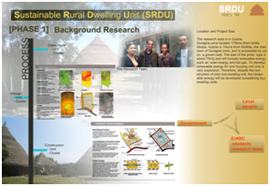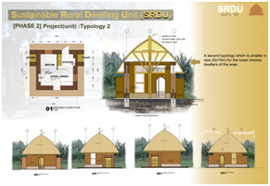1. Bamboo workshop
Berhanu Gebrewold and Meron Kassahun, members of the SRDU research team, attended a workshop on Bamboo organized by Africa Bamboo. Attending such a workshop is believed to contribute towards their research interest on indigenous knowledge and alternative building materials. The four day bamboo workshop, was held at Awassa city from 26 - 29 March, 2012. The famous "bamboo architect" Mr. Jorg Stamm gave hands on training for researchers who came from different institutions. The focus of the workshop was to give practical training on selection, preservation, treatment and construction detailing using solid bamboo.

PhD candidateLara Davis visited Ethiopia in the month of July, 2012. She made a reconnaissance field visit to the SRDU research site Gubrie, 175 Kms from Addis Ababa. The reconnaissance was meant to explore the possibility of relating her PhD to the SRDU research. To have a firsthand experience, in collaboration to EiABC’s Housing Chair, she conducted an intensive workshop entitled: “Building with Earth: Context-Responsive Design & Construction”.
The 5 day intensive workshop, July 16 - 22, 2012, was meant to introduce students and trainees to the concepts and practical aspects of building with earth with contextual sensitivity in Ethiopia. For each day of the workshop, one½ day was devoted to field study and practical exercises, and the other ½ day for theoretical study, documentation, and reflection. Topics covered ranged in scale from identification and behavior of soil, to selecting ratios for construction, to overall design principles for the climate. Practical exercises allowed students to develop a hands-on material-based knowledge. Afternoon lectures for conceptual framing were followed by work sessions for the students. The workshop was concluded with student presentations.


Project description
It is a glaring fact that the Ethiopian rural population, about 80% of the estimated eighty million people, is largely living in housing units that are not only substandard but also incompatible to the current transformative political, economic and social forces. The issue of rural housing is largely neglected, even by the Millennium Development Goals charted by the United Nations Habitat program. This dire situation calls for an immediate intervention for systematic improvement. This research aims to contribute towards the improvement of the rural housing in Ethiopia. It seeks to draw lessons from the vernacular architecture of a rural area and incorporate it into a Sustainable Rural Dwelling Unit (SRDU). The focus of the research is on a one-to-one construction of a housing proto-typology that would primarily embody the positive elements of vernacular architecture within the framework of sustainability. The vision is to develop a rural settlement having the proto-typology as its basic unit. The project has three phases. Phase- 1 deals with the documentation and study of the existing rural housing (vernacular architecture) and local building materials, Phase-2 deals with the construction of a single proto-typology (SRDU) including the use of renewable energy and Phase-3 will focus on the replication of the SRDU into a cluster of four units. This proposal concerns with Phases 1 and 2 only. The research area is in Gubrie, Guraghe Zone located 175 kms from Addis Ababa; the capital of Ethiopia, The footprint size of the proto-typology is about 65m2 and will include renewable energy, such as: solar energy and bio-gas. Developing renewable energy for one housing unit is very expensive. Therefore, the renewable energy will be developed for four dwelling units with the additional three to be constructed in Phase-3.
Innovation and transferability – Progress
Innovative design that is informed by the vernacular architecture of the area and incorporating needs for healthy habitation. A cross cultural transfer of knowledge and skill is believed to be achieved between students and local artisans during construction. Furthermore, transformation of the traditional way of building into the new one is also thought to help for an adaptive transformation of lifestyle towards the unbeatable urbanization.
Ethical standards and social equity - People
An exemplary partnership between local administrators, an academic institution and the local people is secured. Respect for the cultural identity of the people is reflected through the incorporation of symbolic cultural elements, spatial accommodation, and through participation of the local elders.(20 local trainees , 5 roof makers and 3 semi skilled and professionals from the university are expected to participate)
Environmental quality and resource efficiency - Planet
The dominant building materials and energy source being renewable makes the architecture to blend on its site with less interference with the environment
- Earth and bamboo are the dominant building materials
- 67% of bamboo in Africa is found in Ethiopia
Economic performance and compatibility - Prosperity
- A transformable and an adaptable typology for different income groups
- Possibility of self-building using locally available materials
- Job creation possibility and an improved income source for artisans
- The oil plant which is used as a fence in combination with the bio-gas and solar cell reduces the cost of energy consumption
Contextual and aesthetic impact - Proficiency
Keeping the identity of the spatial usage, material of construction and its being constructed by the craftsmanship of the local people, the architecture is believed to blend in its naturally green setting.
Used materials _ Appropriateness
Abundantly available materials like earth, bamboo, and straw are used as dominant materials. The wall is rammed earth with a straw mix resting on a stone gravel foundation; the roof is a bamboo leaf ("honche") applied on basket like bamboo framework. The mezzanine floor is constructed using a light weight earth fill graded on a soil block vault.
Team:
Dr. Elias Yitbarek Alemayehu
Berhanu Gebrewold Genjebo,
Meron Kassahun Asfaw,
Melakeselam Moges Mengistu,
Denamo Addissie Nuramo,
Yohana Eyob Tefera,
Yidnekachew Tesmamma Daget,
Contact
Dr. Elias Yitbarek Alemayehu
Chair Holder of the Chair of Housing
Ethiopian Institute of Architecture, Building Construction and City Development
Addis Ababa University
P. O. Box 518
Addis Ababa, Ethiopia
Phone: +251(0)911 21-57-58
Email: This email address is being protected from spambots. You need JavaScript enabled to view it.
- << Prev
- Next
